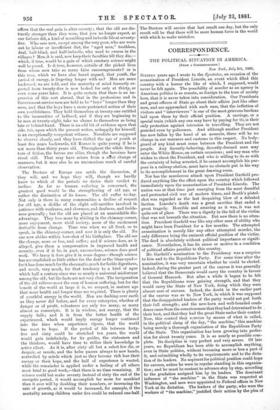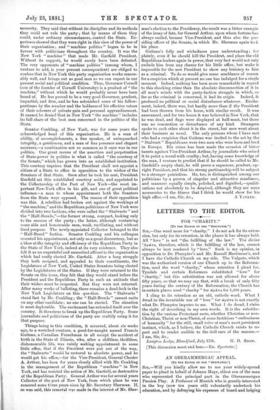CORRESPONDENCE.
THE POLITICAL SITUATION IN AMERICA.
[FROM A CORRESPONDENT:I New York, July 5th, 1881.
SIXTEEN years ago I wrote to the Spectator, on occasion of the assassination of President Lincoln, an event which filled this
country with a horror the like of which, I supposed, would never be felt again. The possibility of murder as an agency in. American politics is so remote, so foreign to the tone of society here, that it is never taken into consideration. Our Presidents and great officers of State go about their affairs just like other men, and are approached with such ease, that the infliction of visitors and " interviewers " is one of the most grievous burdens laid upon them by their official position. A carriage, or a special train (which any one may have by paying for it), is their only protection against intrusion in travelling. They are not guarded even by policemen. And although another President has now fallen by the hand of an assassin, there will be no change in our manners and customs in this respect. No body- guard of any kind must come between the President and the people. Any decently-behaving, decently-dressed man may enter the White House, on certain occasions ; and any man who wishes to shoot the President, and who is willing to do so with the certainty of being arrested, if he cannot accomplish his pur- pose in a railway-station, must have no obstacle put in his way to its accomplishment in the great drawing-room.
Nor has the murderous attack upon President Garfield pro- duced anything like the effect upon the country which followed immediately upon the assassination of President Lincoln. The nation was at that time just emerging from the most dreadful and protracted civil war of modern times, and Booth's pistol- shot was regarded as the last despairing blow of a defeated faction. Lincoln's death was a great sacrifice that ended a great tragedy. Horrible and amazing as it was, it was not quite out of place. There was a dignity in the fall of the victim that was not beneath the situation. But now there is no situa- tion. President Garfield was like any other man of ability who might have been President for a few months. The attempted assassination is merely like any other attempted murder, the only difference being the eminent official position of the victim. The deed is absolutely without political importance or signifi- cance. Nevertheless, it has its cause or motive in a condition of political affairs peculiar to this country. Mr. Garfield's nomination to the Presidency was a surprise to him and to the Republican Party. For some time after the nomination, it was very uncertain whether he could be elected.
Indeed, during the greater part of the canvas it was generally believed that the Democrats would carry the country in favour of General Hancock. But after a while it began to be felt that the Republicans were gaining strength, and that they would carry the State of New York, doing which they were almost sure of success. Indeed, the doubt in the earlier part of the canvas was as to New York, in which it was supposed that the disappointed leaders of the party would not pat forth their full streugth ; and the new-born and well-founded confi- dence came from the consciousness that they had determined to do . their best, and that they had the great State under their control Now, this control they eercise by means of what is called, in the political slang of the day, "the machine," this machine being merely a thorough organisation of the Republican Party of the State. This organisation has been growing into perfec- tion for about twenty years. It is as nearly as possible com- plete. Its discipline is very perfect and very severe. Of late years, no Republican has been able to accomplish anything, even in State politics, without becoming more or less a part of it, and submitting wholly to its requirements and to the dicta- tion of its leaders. No aspirant for political position could hope for success, unless he were in regular standing in this organisa- tion; and he must be content to advance step by step, according to the gradation assigned him by its leaders. The dominant influence of "the machine" in the State was respected at Washington, and men were appointed to Federal offices in New York at its dictation. The leaders of the party, who were the workers of "the machine," justified their action by the plea of necessity. They said that without its discipline and its methods they could not rule the party ; that by means of them they could, under ordinary circumstances, control the State. Ex- perience showed that they were right in this view of the power of their organisation ; and "machine politics" began to be in favour with politicians throughout the country. It was the New York " machine " that made Mr. Garfield President. Without its support, he would surely have been defeated. 'The very opponents of "machine politics" (among whom, I venture to add, is your present correspondent) are obliged to confess that in New York this party organisation works reason- ably well, and brings out as good men as we can expect in our present social and political condition. Thus, Governor Cornell '(son of the founder of Cornell University) is a product of "the machine," without which he would probably never have been heard of. He has proved to be a very good Governor, prudent, impartial, and firm, and he has astonished some of his fellow- partisans by the number and the boldness of his effective vetoes of their schemes of private gain and personal aggrandisement. It cannot be denied that in New York "the machine" includes its full share of the best men concerned in the politics of the :State.
Senator Conkling, of New York, was for some years the -acknowledged head of this organisation. He is a man of -ability, of accomplishments, a fine speaker, of unimpeached integrity, a gentleman, and a man of fine presence and elegant manners,—a combination not so common as it once was in our politics. One great means of the assertion and perpetuation -of State-power in politics is what is called "the courtesy of the Senate," which has grown into an established institution. This courtesy requires that the President shall not appoint a .citizen of a State to office in opposition to the wishes of the Senators of that State. Soon after he took his seat, President Garfield set this established courtesy aside, and appointed to -the Collectorship of the Port of New York—the most im- portant New-York office in his gift, and one of great political Influence—a man to whose appointment both the Senators from the State were opposed. The reason of their opposition w.as this. A rebellion had broken out against the workings of -"the machine," and the Republican politicians of New York were divided into two factions, who were called the" Stalwarts " and -the "Half-Breeds,"—the former strong, compact, looking only to the success of the party ; the latter, although containing some able and honourable men, weak, vacillating, and without -fixed purpose. The newly-appointed Collector belonged to the
" faction. Senator Conkling and his colleague resented his appointment, not only as a great discourtesy, but as allow at the integrity and efficiency of the Republican Party in the State of New York, indeed at its very existence. They also felt it as an ungrateful and unmerited affront to the organisation which had really elected Mr. Garfield. After a long struggle they both resigned, and appealed to their constituents, the Legislature of New York, United States Senators being elected by the Legislatures of the States. If they were returned to the Senate on this issue, they felt that they would stand before the President and the Republican Party in such an attitude that their wishes must be respected. But they were not returned. After many weeks of balloting, there remains a dead-lock in the New York Legislature on this question. The " Stalwarts " stand fast by Mr. Conkling ; the " Half-Breeds " cannot unite -on any other candidate ; no one can be elected. The situation is most deplorable. The excitement has extended itself over the -country. It threatens to break up the Republican Party. Some journalists and politicians of the party are craftily using it for that purpose.
Things being in this condition, it occurred, about six weeks ago, to a wretched creature, a good-for-naught named Francis Guiteau, a Canadian Frenchman in all except the accident of birth in the State of Illinois, who, after a shiftless, thriftless, dishonourable life, was vainly seeking appointment to some little office, that if the President were put out of the way, the " Stalwarts " would be restored to absolute power, and he would get his office,—for the Vice-President, General Chester A. Arthur, has been for years closely allied with Mr. Conkling in the management of the Republican " machine " in New York, and has resisted the action of Mr. Garfield, as destructive of the Republican Party. General Arthur was for several years Collector of the port of New York, from which place he was removed some three years since by Mr. Secretary Sherman. If, as-was said, this removal wits made in the interest of Mr. Sher-
man's election to the Presidency, the result was a bitter example of the irony of fate, for General Arthur, upon whom fortune has always smiled, became Vice-President, and thus also the pre- siding officer of :the Senate, in which Mr. Sherman again took his place.
Guitean's folly and wickedness pass understanding ; for plainly, even if he should kill the President, and place the old Republican leaders again in power, that very fact would not only exclude him from any chance for his little office, but make it impossible for the new President to show any leniency to him as a criminal. To do so would give some semblance of reason for a suspicion which at present no one has indulged for a single moment. Indeed, nothing has been more remarkable in regard to this shocking crime than the absolute disconnection of it in all men's minds with the party-faction struggle in which, so far as the criminal is concerned, it had its origin. Indeed, it produced no political or social disturbance whatever. Excite- ment, indeed, there was, but hardly more than if the President had been thrown from his horse, with similar result. It was announced, and for two hours it was believed in New York, that he was dead, and flags were displayed at half-mast, but there was no commotion or disturbance of any kind. Strangers spoke to each other about it in the street, but men went about their business as usual. The only persons whom I have met who had a suspicion that Guiteau was incited to the act by the " Stalwart " Republicans were two men who were born and bred in Europe. His crime has been made the occasion of bitter taunts against Vice-President Arthur, by journalists who seized it to point a moral with cruelty; but, having some knowledge of the man, I venture to predict that if be should be called to Mr. Garfield's empty chair, he will prove a sagacious, prudent, up- right President, and that his strong partisanship will be subject to a stronger patriotism. He, too, is distinguished among our politicians by a person of singular and attractive manliness, and manners equally simple, polished, and dignified,—qualifi- cations not absolutely to be despised, although they are mere accessories to the fitness that I think he would show for his



































 Previous page
Previous page